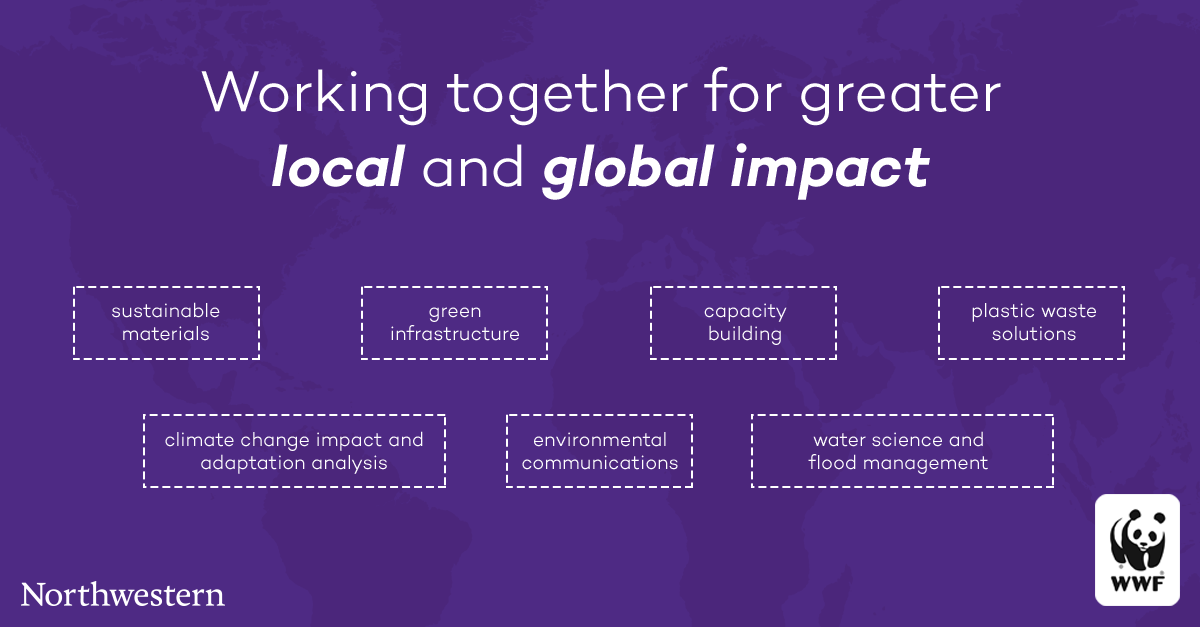Northwestern and World Wildlife Fund Join Forces to Advance Local and Global Sustainability
Signed memorandum of understanding to accelerate innovation
This month, Northwestern University and World Wildlife Fund (WWF) signed a memorandum of understanding (MOU) outlining their collaborative strategy for advancing solutions to local and global sustainability and biodiversity conservation challenges.
“We are thrilled to be formalizing our strategic alliance with World Wildlife Fund on World Environment Day,” said Michael R. Wasielewski, executive director of the Institute for Sustainability and Energy at Northwestern (ISEN). “Northwestern’s expertise in science, engineering, and law has great synergies with WWF’s renowned work in global conservation science and public policy advocacy. This agreement brings together two exceptional institutions, allowing us to explore new ideas and deploy solutions more quickly.”

The MOU outlines initial joint objectives and research areas including: sustainable materials, green infrastructure planning, water science and flood management, plastic waste solutions, climate change impact and adaptation analysis, environmental communications, and training for policymakers, advocates, and students.
“Working with faculty and students at Northwestern is helping us train the next generation of environmental leaders. Bringing new and valuable perspectives and partnerships to the table will help us invent new solutions to address the impacts of a changing climate,” said Anita van Breda, World Wildlife Fund’s senior director of environment and disaster management.
In addition to identifying new areas of collaboration, the MOU builds upon ongoing projects between Northwestern and WWF. The two institutions have worked together to protect Arctic marine species from underwater noise pollution, to develop an environmental guide for building materials selection for reconstruction following disasters, and to quantify ecosystem impacts and sustainable design interventions for proposed transportation infrastructure projects in Myanmar.
The two organizations have also developed student internship opportunities, including the placement of journalism students at WWF’s Environment and Disaster Management program headquarters in Washington, DC.
“At WWF, we believe in partnerships to devise innovative solutions to the issues that challenge us today. Northwestern’s talented faculty and staff’s eagerness to join forces with WWF will lead to new pathways that help us build a more sustainable future,” said Kate Newman, World Wildlife Fund’s vice president of forest and freshwater public sector initiatives.
“No single entity can solve the complex challenges stemming from climate change alone,” said Demetria Giannisis, ISEN’s managing director. “Over the next several years, we will continue to work together to integrate our expertise, resources, and networks for greater global impact.”
About Institute for Sustainability and Energy at Northwestern: ISEN is Northwestern’s university-wide Institute to advance global sustainability and energy solutions through transformational research, interdisciplinary education, and public engagement, and will continue to lead the implementation of the alliance with WWF on behalf of the University.
MEDIA CONTACT:
Mike M. McMahon, Institute for Sustainability and Energy at Northwestern (ISEN): (847) 467-1361, mike.mcmahon@northwestern.edu